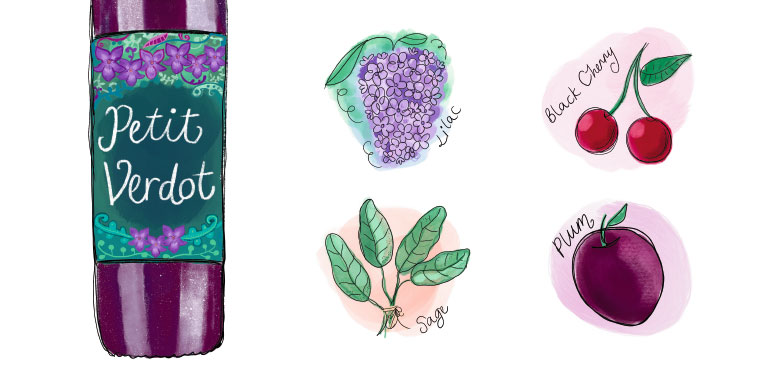
Wine
Facts on Petit Verdot
{peh-tee vur-doh}
I would bet there aren’t many wines made from Petit Verdot in your home cellar. It’s probably not your first choice when out and about, either. You may have tried it before, though, likely many times – without even knowing. That’s because Petit Verdot is one of those ‘hidden’ or ‘blending’ varieties, that too often live in the shadow of more noted grape varieties. Let’s shine a little light on this quiet achiever...
Shop Petit Verdot & More
Petit Verdot In France
Petit Verdot tends to be overshadowed by the noted red grape varieties of Bordeaux – Cabernet Sauvignon most notably – but also Merlot, Cabernet Franc and even Malbec, and is used in small amounts as a blending ingredient in Bordeaux reds. Believed to have originated further south in the warmer Midi-Pyrénées, it is a late-ripening variety that seems to like the heat.
Translating roughly as “little green one”, Petit Verdot often struggles to ripen, producing slightly green berries in moderate climates. As such, it’s only used in small amounts in blends, falling out of flavour with growers in Bordeaux in the 20th century as many opted to replace their Petit Verdot vines with earlier ripening Cabernet Franc and Merlot.
Petit Verdot in the Rest of the World
Petit Verdot is not notably planted elsewhere in France. Nonetheless, it has travelled across the globe, hitching a ride with its other Bordeaux stablemates. The love affair California has with the varieties of Bordeaux has resulted in many wineries planting small volumes of Petit Verdot.
It has also found a home in Chile and Argentina as well as along the west coast of central Italy. Unsurprisingly, wherever it appears, it is used much like it is in Bordeaux – in small amounts in blends – however there has been an increasing number of single varietal wines made from the warmer climates of Spain, Italy and Portugal.
Petit Verdot in Australia
Petit Verdot arrived in Australia in the 1830s as part of James Busby’s collection, but led a modest life here up until the 1990s when Bill Moularadellis of Kingston Estate saw what the variety could do in the warmer climate of the Riverland and went on a planting blitz.
By the early 2000s, Australia had four times the plantings of France with the vast majority being Kingston’s. This has receded a touch, but the warm inland regions that are Murray River reliant still account for over 90% of the countries plantings. Individual plantings are small, with the grapes normally blended into Cabernet-based wines.
Common Characters of Petit Verdot
Petit Verdot grapes are thick-skinned and deep in colour. The resulting wines share that colour depth and display high levels of tannin. They can showcase aromas of violets with aromas and flavours of blackberries, mulberries and blueberries, and are full-bodied and powerful wines with high natural acidity as well.
Food Pairing with Petit Verdot
Petit Verdot wines are rich and intense, pairing best with richly flavoured dishes like barbequed and braised red meat dishes, while also complementing the rich flavours of beans, lentils and mushrooms. Hard cheeses are also a superb accompaniment.